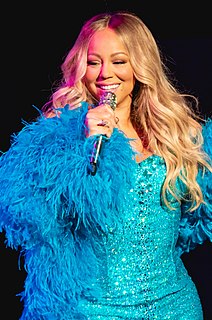
American singer Mariah Carey has released 86 official singles, 22 promotional singles, and has made 30 guest appearances. Her self-titled debut album in 1990 yielded four number-one singles on the Billboard Hot 100, the first being "Vision of Love", a song credited with revolutionizing the usage of distinguished vocal stylings, predominantly the practice of melisma, and effectively influencing virtually every female R&B performer since the 1990s. Subsequent singles "Emotions" (1991) and Carey's cover of the Jackson 5 track, "I'll Be There" (1992) continued the singer's streak of US number-one singles, with the latter becoming her fourth chart-topper in Canada and first in the Netherlands. With the release of Carey's third studio album, Music Box (1993), the singer's international popularity surged upon release of "Hero" and the album's third single, her cover of Harry Nilsson's "Without You", which became the singer's first number-one single in several countries across Europe.
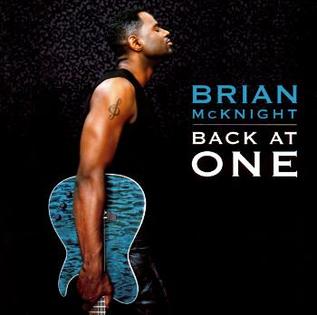
Back at One is the fifth studio album by American singer Brian McKnight, released on September 21, 1999, by Motown Records. The album followed the same pattern as McKnight's previous album of original material, Anytime (1997), in which he began his transition from urban adult contemporary into the hip hop soul market. Back at One contains a mix of hip hop-influenced contemporary R&B songs, as well as a variety of ballads. While McKnight co-wrote and produced nearly every song on the album, he also worked with a few new producers, including Rodney Jerkins, his brother Fred Jerkins III, and Anthony Nance.

"Real Love" is a 1992 song recorded by American singer Mary J. Blige for her debut studio album, What's the 411? (1992). It was written and produced by Cory Rooney and Mark Morales. The song samples Audio Two's 1987 song "Top Billin'", and was issued as the album's second single on August 25, 1992. It became Blige's first top-ten hit, peaking at number seven on the US Billboard Hot 100. It also reached the top on both the Billboard Hot R&B/Hip-Hop Songs and Rhythmic charts, and was eventually certified Gold by the Recording Industry Association of America on November 4, 1992.
American rapper Mase has released three studio albums and twenty-two singles, including ten as a featured artist.

Superhero is the sixth album by American singer Brian McKnight. It was first released by Motown Records on August 28, 2001 in the United States. McKnight recorded this album to showcase his many musical influences and give listeners a glimpse into the past year of his life. Superhero mixes McKnight's usual contemporary R&B style with a touch of rock and roll and rap music. McKnight worked with a variety of producers on the album, including Battlecat, Bill Meyers, Anthony Nance, Steve Thompson, and Lavel "City Spud" Webb. Featured guest vocalists were Justin Timberlake, Nate Dogg, Fred Hammond, and hip hop group St. Lunatics.
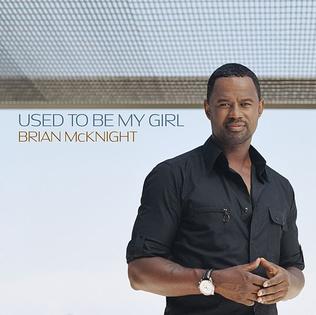
"Used to Be My Girl" is a song by American singer Brian McKnight. It was written by McKnight along with Tim Kelley and Bob Robinson for his ninth studio album Ten (2006), while production was helmed by Kelley and Robinson under their production moniker Tim & Bob. The song peaked at number 25 on the Billboard Hot R&B/Hip-Hop Songs chart. The song was released as the album's lead single on October 17, 2006 and peaked at number 25 on the Billboard Hot R&B/Hip-Hop Songs chart.

The discography of Brian McKnight, an R&B singer, consists of fifteen studio albums, six compilation albums, more than forty singles, and nineteen music videos. McKnight has sold more than 25 million albums worldwide.
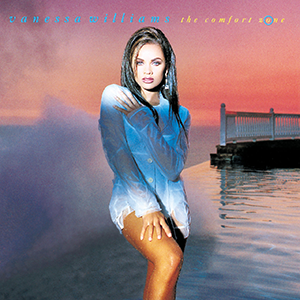
The Comfort Zone is the second studio album by American singer and actress Vanessa Williams, released on August 20, 1991, by Mercury's Wing Records Label.
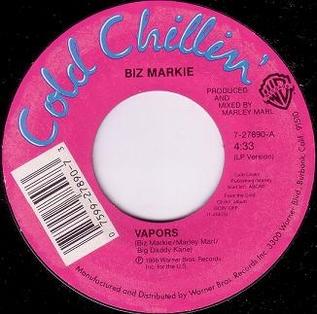
"Vapors" is a song co-written and performed by American hip hop musician Biz Markie, issued as the fifth single from his debut studio album Goin' Off. The song peaked at #80 on the Billboard R&B chart in 1988. The song features an unauthorized sample/interpolation from James Brown's 1974 smash "Papa Don't Take No Mess".

"One Last Cry" is a song co-written and co-produced by Brandon Barnes, Melanie Barnes and Brian McKnight. The song was performed by American contemporary R&B singer Brian McKnight, issued as the fourth single from his eponymous debut album. It was McKnight's first solo hit on the Billboard Hot 100 chart, peaking at number 13 in 1993.
"Maybe I Deserve" is a song written, produced and performed by American contemporary R&B singer Tank, issued as the first single from his debut studio album Force of Nature. The song is his biggest hit to date on the Billboard Hot 100, peaking at #38 in 2001.

"He Can't Love U" is a song performed by American contemporary R&B group Jagged Edge, issued as the second single from their second studio album J.E. Heartbreak. Co-written by group members Brian and Brandon Casey, the song peaked at #15 on the Billboard Hot 100 in 1999.

"Stone Cold Gentleman" is a song performed by American contemporary R&B singer Ralph Tresvant, issued as the second single from his eponymous debut album. It originally appeared on the album under the title "Stone Cold Gentleman ", but the title was shortened for commercial release. The song features a rap from fellow New Edition member Bobby Brown; and it peaked at number 34 on the Billboard Hot 100 in 1991.

"Something in Your Eyes" is a song co-produced and performed by American contemporary R&B group Bell Biv DeVoe, issued as the second single from the group's second studio album Hootie Mack. It was the only song from the album to chart on the Billboard Hot 100, peaking at #38 in 1993.
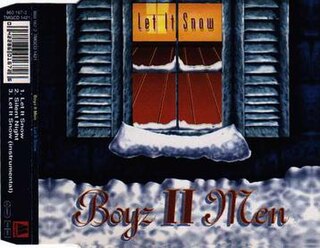
"Let It Snow" is a song co-produced and performed by American contemporary R&B group Boyz II Men, featuring vocals from fellow American contemporary R&B singer Brian McKnight. The song was issued as the only official single from the group's holiday album Christmas Interpretations. Written by McKnight and Boyz II Men member Wanya Morris, it peaked at number 32 on the Billboard Hot 100 in 1993. It is a prequel to the song entitled "Let It Snow '98" by McKnight and themselves, from McKnight's first Christmas album Bethlehem, which was released five years later.

"Don't Talk" is a song written, produced and performed by American contemporary R&B singer Jon B, issued as the only official single from his third studio album Pleasures U Like. The song peaked at #58 on the Billboard Hot 100 in 2001.

"Take Care of Home" is a song performed by American contemporary R&B singer Dave Hollister, issued as the second and final single from his second studio album Chicago '85... The Movie. The song peaked at number 39 on the US Hot R&B/Hip-Hop Songs chart in 2001.

"Gotta Go Gotta Leave (Tired)" is a song co-written and performed by American contemporary R&B singer Vivian Green, issued as the lead single from her second studio album Vivian. On July 30, 2005, it became her second song to reach #1 on the Billboard dance chart.

"Do You Like This" is a song co-written and performed by American contemporary R&B singer Rome, issued as the second single from his eponymous debut album. It was his last song to chart on the Billboard Hot 100, peaking at #31 in 1997.

"Heaven" is a song co-written and performed by American contemporary R&B band Solo, issued as the first single from their eponymous debut studio album. The song was the band's highest chart appearance on the Billboard Hot 100, peaking at #42 in 1995.


















